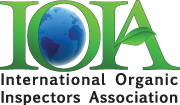Ethics
All IOIA inspector members agree to abide by IOIA's Code of Ethics and Code of Conduct as part of their membership.
IOIA also has an Ethics Committee and a complaint procedure for investigating possible violations of these codes.
In the event of a dispute, the venue for resolution will be in Montana.
Complaint query currently under revision.
IOIA Code of Ethics
- Inspectors agree to abide by IOIA Bylaws, Code of Ethics, Code of Conduct and honor all confidentiality agreements pertaining to their work as organic inspectors. IOIA is the final arbiter of the interpretation of its own documents and follows its complaint procedure if certification bodies file a complaint and make a contractual dispute the subject of a violation of IOIA policies.
- Inspectors support and encourage the development, implementation and advancement of organic agriculture and processing.
- Inspectors may also be members of, employees of, and/or certified by, regional, federal, or international certification bodies, but shall maintain a clear separation of inspection duties from certification decision-making.
- Inspectors agree to follow the policies and procedures relating to conduct and ethics of all certifying agents/bodies for whom they work.
- While performing in the professional capacity of an organic inspector or representing IOIA, inspectors shall be fair and impartial regarding various certification programs, provided that such programs meet minimum federal, state, provincial, or international organic standards.
- Inspectors shall avoid situations of conflict of interest.
- Inspectors shall refuse work which obliges them to make final decisions (as opposed to recommendations).
- Inspectors should develop and upgrade their qualifications and competencies in accordance with IOIA accreditation standards and procedures. Inspectors must have a sound working knowledge of the policies, regulations and standards of all applicable certifying bodies and regulatory agencies.
- Inspectors should be sensitive to the social, political, and environmental variables of the region when inspecting.
- Inspectors should maintain the highest possible standards of inspector integrity. They have the responsibility to report suspected fraud, pertaining to their work as organic inspectors, to the appropriate authorities.
Revised: 3/25/2025
IOIA Code of Conduct
- Inspectors shall make available to inspected parties, upon request, copies of signed confidentiality agreements, the IOIA Code of Ethics, and IOIA Code of Conduct. Inspectors shall abide by confidentiality agreements with all certifying bodies for which they conduct inspections. All proprietary information is to be held in strict confidence.
- Association Mission Statement: The mission of the International Organic Inspectors (IOIA) is to address issues and concerns relevant to organic inspectors, to provide quality inspector training, and to promote consistency and integrity in the organic certification process.
- Inspectors may offer their experience and insights by serving on various industry boards or committees, but inspectors shall not make final decisions pertaining to the certification status of operations they inspect.
- Inspectors are encouraged to foster goodwill and cooperation in the organic industry.
- Regarding conflict of interest, inspectors:
- a. shall not have had any financial/consulting relationship with the inspected party during the year prior to and the year following inspection.
- b. shall not inspect close associates or competitors.
- c. shall not receive any remuneration as a result of information gained or shared during the inspection.
- d. shall not solicit work directly from inspected parties. Inspections are to be conducted only if authorized by certifying bodies.
- e. may purchase goods from inspected parties, but these purchases are to be done solely for personal use and not for resale and must not impinge on the professional relationship.
- f. shall politely refuse gifts, subject to local culture.
- Inspection reports should be accurate, thorough, and assess compliance with applicable standards of the certification body, and do not make final decisions regarding operations inspected or constitute certification.
- Inspectors should refuse work which is beyond their realm of competence. Inspectors shall work individually and collectively to provide professional upgrading and excellence. Inspectors should follow a "2 defect" guideline when considering accepting work in foreign lands. This means that out of the variables of language, cultural practices, and crops, the inspector should be competent in at least 2 of the 3 variables.
- In preparing for inspections, inspectors should obtain certification committee summaries from the previous year. Any past recommendations, conditions and controversial issues should be thoroughly investigated during the inspection process.
- Inspectors are the eyes, ears, and nose of the consumer. At all times during the inspection, the inspector must be thorough, courteous, knowledgeable, honest and open-minded.
